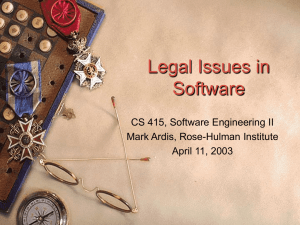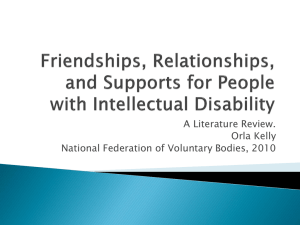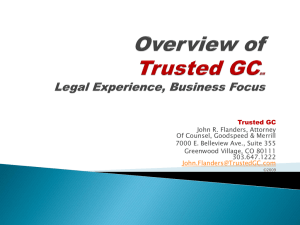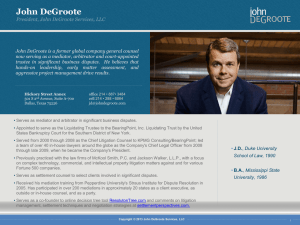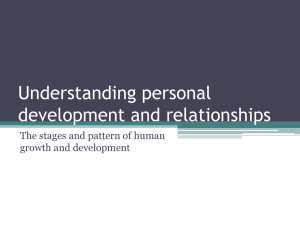Slide 0 - iThreat Cyber Group
advertisement
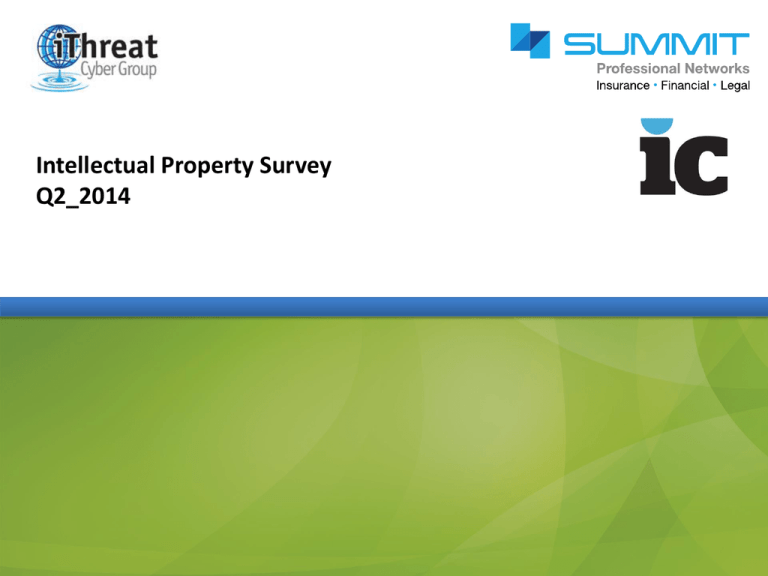
Intellectual Property Survey
Q2_2014
Purpose & Method
Purpose:
InsideCounsel conducted a QuickPulse survey to gain a deeper understanding of intellectual property
rights holders and those responsible for protecting them.
Method:
Online survey conducted March 20th – May 7th 2014
Sample Recruitment:
Email invitations
High impact ad units and ROS banner campaign on insidecounsel.com
Banner ad placement within InsideCounsel editorial newsletters
Confidence Level: 95%
106 usable responses*
*Usable: Respondents who selected their primary job function in question #1 as Corporate General Counsel, Business Unit/General Division Counsel,
or Deputy General Counsel and selected yes to working in a Fortune 1000 company in question #2. Other Inside Counsel responses in
question #1 were reclassified if they met qualifications of the program. The reclassifications were determined by pulling additional data from
InsideCounsel database. All other respondents were terminated from the survey, and were not used in tabulation/analysis for this report.
Respondent Profile
45.3%
Corporate General Counsel
17.0%
Business Unit/Division General
Counsel
Deputy General Counsel
21.7%
Other Inside Counsel
16.0%
Q1. Which of the following most closely describes your role? (please select one)
Base 106
Level of Concern
88% of respondents are very or
somewhat concerned about their
organization’s intellectual property
Very
concerned
41.5%
Somewhat
concerned
46.2%
Not
concerned
26.5%
0.0%
5.0%
10.0%
15.0%
20.0%
25.0%
30.0%
35.0%
40.0%
45.0%
50.0%
Q.3 How concerned are you about your organization’s intellectual property protection?
Base 106
Concern Ranking
Very Concerned
Somewhat
Concerned
Not Concerned
Copyright infringement
22%
43%
35%
Trademark counterfeiting
28%
46%
26%
Trade secret theft
39%
21%
39%
Patent trolls/NPEs
43%
36%
21%
Q4. Please rank your level of concern about your intellectual property rights protection
in the following areas:
Base 104
4
Preparedness
60.0%
40.0%
66% of respondents indicate
their organization is only
moderately prepared or not
prepared to prevent a
significant attack
53.8%
33.7%
20.0%
7.7%
4.8%
0.0%
Very well prepared
Moderately
prepared
Moderately
unprepared
Very unprepared
Q5. How prepared is your organization to prevent a significant, material attack on your
product, brand, or intellectual property? (please select one)
Base 104
Q5. Preparedness Commentary
Very well prepared
We are constantly vigilant about protecting our brands
and enforcing our intellectual property rights.
We have devoted significant resources to business, IP and
reputation protection.
Moderately prepared
Moderately unprepared
Coordinating between the business teams, who become aware of issues,
and the legal teams is challenging in a large corporate environment.
Several safeguards are in place and we have a team who has dealt with
such issues in the recent past. Need more monitoring capability and management
buy in /cash support.
Proactive and ongoing steps to monitor patent/IP infringement, however
it remains an ongoing concern given the disparity of patent regimes in
the world, particularly China where a Chinese company can obtain a
design patent on designs which are in the public knowledge
in other parts of the world.
As a fortune 20 company we've only had one in-house
IP attorney for the past 3 years.
Very robust IT and data security process that we continue to enhance. We
understand it is impossible to build a system that can guarantee no breach.
We regularly face such attacks globally. We have systems
in place to respond that are ever-vigilant.
We are too dependent on hearing of such issues only secondarily through
our associates, and we do not have a thorough enough monitoring
process to catch issues early.
Need more efforts to educate employees about
intellectual property
We monitor competitive products and watch when employees leave to
work for competitors. However, getting business approval for high price litigation
remains a challenge.
No plan other than to know who to call.
My company is very well prepared to prevent a significant,
material attack on our product, brand and or intellectual
property as many safeguards have been put in place to
combat any form of cyber attack
We have a staff of intellectual property lawyers vigilant in
protecting our brand.
We have a process in place to address concerns of IP infringement
reactively, but nothing that would be considered proactive.
Within the US we are confident that we police the unauthorized us
of our IP rigorously. Outside the states, we have less protection
There is always room for improvement on processes and procedures.
We have a strong IP department, but could always be
more proactive.
I think we've made significant strides but still have a ways to go.
Q6. Please comment on your answer to question 5 {open-ended}
“How prepared is your organization to prevent a significant, material attack on your product, brand, or intellectual property?”
Base 50
Response Confidence Level
Very Confident
51.9%
Moderately Confident
42.3%
5.8%
Not Confident
Q7. Should your organization be the target of a significant, material attack on your product, brand,
or intellectual property, how confident are you in your ability to respond and recover quickly?
(please select one)
Base 104
Q7. Response Confidence Commentary
Very confident
Moderately confident
Because of the safeguards my company has put in place, I am
extremely confident that should my organization be the target
of a significant, material attack on its product, brand,
or intellectual property that we would have no
problems responding and recovering quickly.
Again, communication is key; having the information
provided to legal counsel in a timely manner is challenging.
However, I feel that our legal counsel is very knowledgeable
and would be able to seek protection.
Have experienced team in place and have the
resources to deal with it.
Depends on the attack but we have prepared for this.
History has shown that we can move quickly and effectively
when faced with IP threats
Fortunately have not had to deal with that issue yet.
We have good internal expertise and good
experience with registering or marks and responding
to ad hoc infringements, but not sure how we would
withstand a more organized, intentional, material
attack on our brands.
IT has security measures in place
Getting business approval for high priced litigation
is a challenge.
Our risk management program is well established
and comprehensive.
No one can prepare for all contingencies, nor
budget for them.
We have a 10 yr history of defending our trademarks
and patents and are prepared to fight to counter
anyone stealing our protected work.
The main threat is a competitive one, and we have sufficient
IP protection in place (strategic patent protection and
sufficient patents for offensive use) that I am moderately
confident. However, China concerns me; we are ramping
Up our China patent portfolio and have concerns about
the Chinese legal system's willingness to be fair and
respect those patents and strike down bad patents.
We have a strong trademark enforcement program
We have extremely competent attorneys on staff and
outside counsel who support and defend our brands.
We have the necessary processes in place to manage this.
We monitor and have resources in place to react.
We monitor constantly, and have both in-house
and outside counsel expertise.
Not confident
Again, as an organization our IP practice
is significantly overburdened due to lack
of bandwidth.
I think we have the resources to respond if necessary.
Not sure we have preparedness plan in place.
Our business is sufficiently diversified.
We have people in place who are supposed to
take care of this.
Q8. Please comment on your answer to question 7 {open-ended}
Should your organization be the target of a significant, material attack on your product, brand, or intellectual property,
how confident are you in your ability to respond and recover quickly? (please select one)
Base 37
Resource Gaps
35.0%
30.0%
77% of respondents feel their organization
has resource gaps in awareness,
understanding and/or acting on emerging
threats
33.0%
26.2%
28.2%
23.3%
25.0%
19.4%
20.0%
15.0%
10.0%
5.0%
0.0%
Awareness of
Understanding
Acting on
existing/emerging existing/emerging existing/emerging
threats
threats
threats
All of the above None of the above
Q9. Where do you feel your organization has resource gaps to prevent and/or respond to
an intellectual property attack? (select all that apply)
Base 103
IP Valuation
Yes
68.9%
No
31.1%
Q.10 Does your corporation have an accurate valuation of its intellectual property
holdings?
Base 103
IP Greatest Concerns
Global Attacks
Again, not so much patent trolls as we are a
B-2-B company, but since we are in the
life-sciences industry and we are concerned
about the emergence of patent trolls
in this sector. China remains a concern
as we see Chinese companies violating our
IP to manufacture and sell the low end of
our product lines and sell first in China,
but then try to move to other foreign
markets. Finally, it is always difficult to
make the case for and justify the costs to
protect our IP, and this remains a
struggle today.
Technology
Cost
Internal
Trade secret/data theft in emerging regions
and data security.
Major concern for a smaller company like
ours is the cost of enforcing IP rights. Often
the breaches/infringement result in
damages that do not justify the incredibly
high cost of litigation in this area - so
infringers have significantly less incentive to
settle
Business method patents pose the greatest
threats, especially in terms of processes we
utilize. Trade secrets are also at risk in a large
company with so many employees, but our
turnover is not all that great, and we do a good
job, in my opinion, of making employees
understand the importance of our trade secrets
to the company, and the risks to them should
they misappropriate or reveal them.
Patent troll claims, which can be expensive to
defend against.
Use of competitive proprietary information by
"trusted" independent distributors of our
products to roll business to a competitor.
Patent trolls and the expense associated
with defending those types of cases.
Individual leaks -controlling / monitoring
hundreds of employees who might be tempted
to steal/sell information
Enforcement of IP rights against large clients
in foreign countries - copying of technology/IP
in certain foreign jurisdictions. main
exposure thus far has been China.
Attacks are constant and global. It is hard
to learn of them all.
Keeping up with technological changes.
Organized, intentional attack on our brands
in international jurisdictions (particularly Asia).
Protection of our proprietary data and
information systems
Monitoring global misuse
The cloud
Recent AIA legislation makes the US atmosphere
less patent friendly. IPRs are expensive and
Managing the protection of trade secrets from
do not act like European oppositions
all sorts of threats including BYOD policies.
which are simple, less expensive and do not
create estoppels.
Escalating costs of annuities and expansion
of portfolio is leading to accelerating
pace of expenses.
Threats outside the U.S.
Employees handing over information
unknowingly
Departing employees
Q.11 Please comment on areas of greatest concern for you with regard to intellectual
property rights protection: {open-ended}
Base 49


